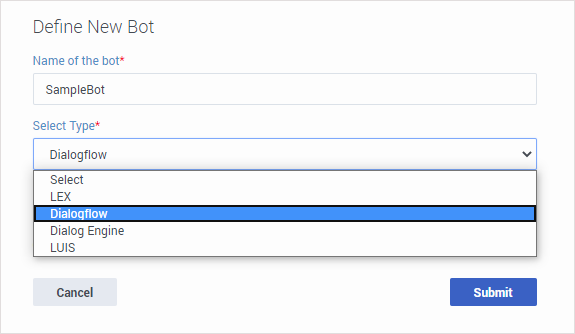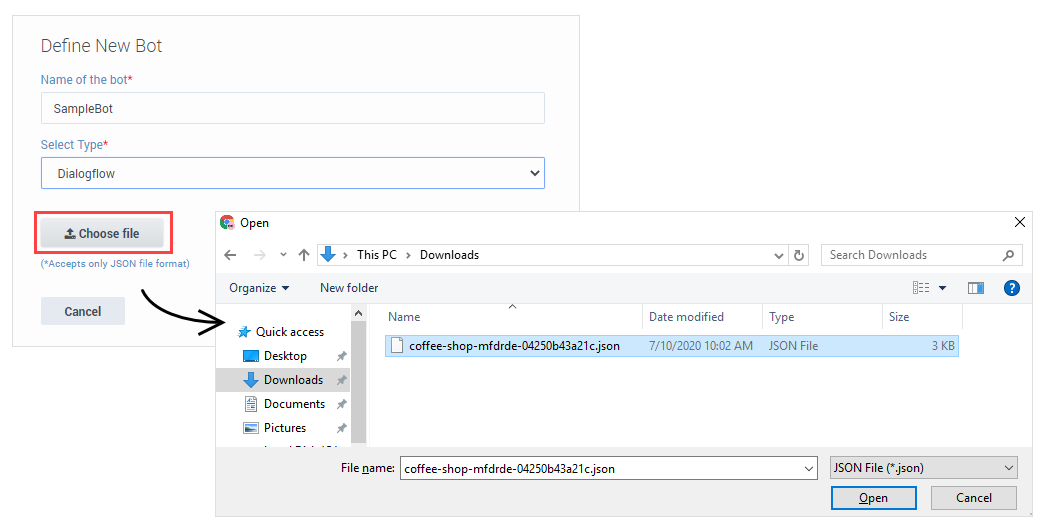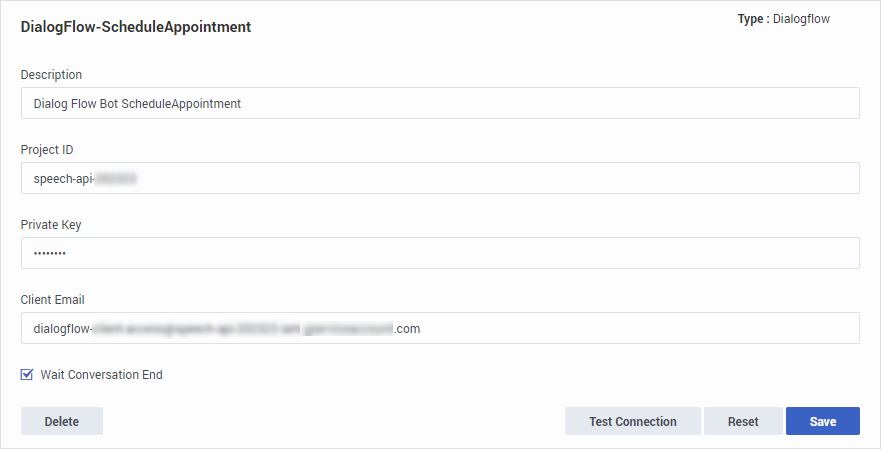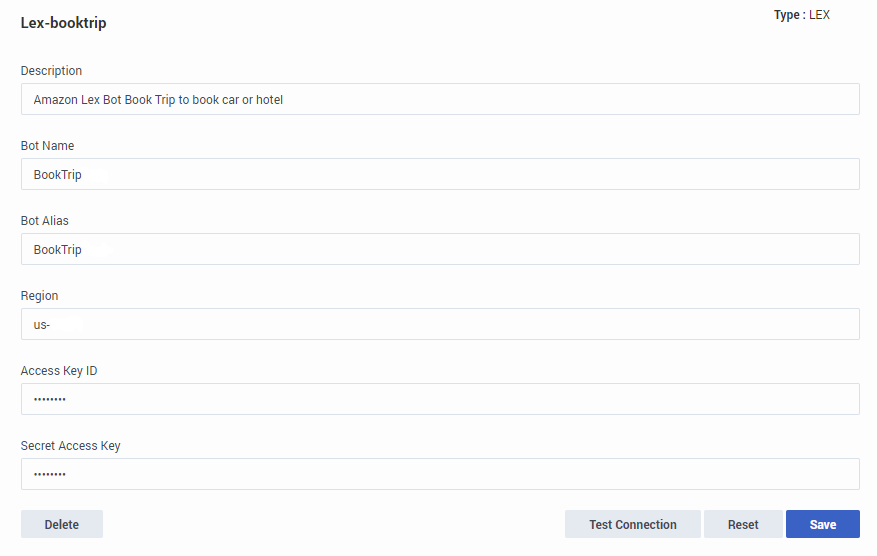Difference between revisions of "DES/Current/Designer/BotRegistry"
m (Text replacement - "{{#widget:Vimeo" to "{{Video") |
(Published) |
||
| Line 33: | Line 33: | ||
[[File:Des_define_bot.png|link=https://all.docs.genesys.com/File:Des_define_bot.png]] | [[File:Des_define_bot.png|link=https://all.docs.genesys.com/File:Des_define_bot.png]] | ||
| − | + | Add your bot details to the registration page. Each bot type has certain fields that are unique to that bot provider. The following sections contain more information about adding that particular bot type: | |
| − | + | *{{Link-SomewhereInThisVersion|manual=Designer|topic=BotRegistry|anchor=dialogflow|display text=Adding a Dialogflow bot to the registry}} | |
| + | *{{Link-SomewhereInThisVersion|manual=Designer|topic=BotRegistry|anchor=|display text=Adding a Lex bot to the registry}} | ||
| − | + | If you are not sure where to get the information that is required to register the bot, check with your bot service provider. | |
After you've entered the settings for your bot, you can click '''Test Connection''' to check if Designer can communicate with it. If the test fails, check your bot details and try again. | After you've entered the settings for your bot, you can click '''Test Connection''' to check if Designer can communicate with it. If the test fails, check your bot details and try again. | ||
| − | When you are finished, click '''Save''' to add it to the registry. | + | When you are finished, click '''Save''' to add it to the registry. You can now use the bot in your applications by adding a {{Link-SomewhereInThisVersion|manual=Designer|topic=BotBlock|display text=Bot Block}} to your application. |
| − | + | <br />{{AnchorDiv|dialogflow}} | |
===Adding a Dialogflow bot to the registry=== | ===Adding a Dialogflow bot to the registry=== | ||
| − | For '''Dialogflow''' bots, you can import a JSON file that contains all of the required settings for your bot resource. You can export this file from your Dialogflow account page. If you need help doing this, refer to the Dialogflow documentation. | + | For Google '''Dialogflow''' bots, you can import a JSON file that contains all of the required settings for your bot resource. You can export this file from your Dialogflow account page. If you need help doing this, refer to the Dialogflow documentation. |
[[File:Des_add_dialogflow_bot.png|link=https://all.docs.genesys.com/File:Des_add_dialogflow_bot.png]] | [[File:Des_add_dialogflow_bot.png|link=https://all.docs.genesys.com/File:Des_add_dialogflow_bot.png]] | ||
| − | ==== Wait Conversation End ==== | + | ====Wait Conversation End==== |
After the settings for the Dialogflow bot are added, you can select an optional setting called '''Wait Conversation End'''. When enabled, the {{Link-SomewhereInThisVersion|manual=Designer|topic=BotBlock}} recognizes intents that are marked as end-of-conversation intents in the bot. | After the settings for the Dialogflow bot are added, you can select an optional setting called '''Wait Conversation End'''. When enabled, the {{Link-SomewhereInThisVersion|manual=Designer|topic=BotBlock}} recognizes intents that are marked as end-of-conversation intents in the bot. | ||
| Line 55: | Line 56: | ||
[[File:des_bot_registry_dialogflow_ex.png|link=https://all.docs.genesys.com/File:Des_bot_registry_dialogflow_ex.png]] | [[File:des_bot_registry_dialogflow_ex.png|link=https://all.docs.genesys.com/File:Des_bot_registry_dialogflow_ex.png]] | ||
| + | |||
| + | <br />{{AnchorDiv|addLex}} | ||
| + | ===Adding a Lex bot to the registry=== | ||
| + | For Amazon Lex bots, you'll need to provide the following details: | ||
| + | |||
| + | *'''Bot Name''' – The name of the bot in Lex. | ||
| + | *'''Bot Alias''' – The name of the alias that the bot was published to. (An ''alias'' points to a specific version of your Lex bot.) | ||
| + | *'''Region''' – The region the bot is located in. This corresponds to the region indicated in your Amazon Web Services (AWS) console (e.g. us-east-1, us-west-2). | ||
| + | *'''Access Key ID''' and '''Secret Access Key''' – These credentials are created and managed from AWS Identity and Access Management (IAM) and require the appropriate permissions to interact with Lex. | ||
| + | |||
| + | '''Example:''' | ||
| + | |||
| + | [[File:des_bot_registry_lex_ex.png|link=https://all.docs.genesys.com/File:Des_bot_registry_lex_ex.png]] | ||
|Status=No | |Status=No | ||
}} | }} | ||
}} | }} | ||
Revision as of 18:16, June 17, 2021
Contents
The Designer Bot Registry contains a collection of bot resources you can use in your applications.
Before you start
The Bot Registry does not enable you to create bots. Rather, it stores information about bots that you've configured with a supported bot services provider, such as Google DialogFlow, Amazon Lex, or Genesys Dialog Engine.
Before you can add a bot resource to the registry, you'll need to set it up with one of the supported bot services providers. During registration, you also might need to provide certain account details, such as any URLs, user IDs, or passwords that are required to access the bot. If you are not sure where to get the information required to register the bot, check with your bot service provider.
After you've added a bot to the registry, you can start using it by adding a Bot Block to your application.
Adding a bot resource to the registry
Watch: This video shows a quick demonstration of how to add a bot resource to Designer. The steps are described in more detail below.
Click Add Bot Definition and enter a Name for the bot resource (check valid naming characters for a list of approved characters you can use when naming a bot resource).
For the Type, select your bot service provider and click Submit.
Add your bot details to the registration page. Each bot type has certain fields that are unique to that bot provider. The following sections contain more information about adding that particular bot type:
If you are not sure where to get the information that is required to register the bot, check with your bot service provider.
After you've entered the settings for your bot, you can click Test Connection to check if Designer can communicate with it. If the test fails, check your bot details and try again.
When you are finished, click Save to add it to the registry. You can now use the bot in your applications by adding a Bot Block to your application.
Adding a Dialogflow bot to the registry
For Google Dialogflow bots, you can import a JSON file that contains all of the required settings for your bot resource. You can export this file from your Dialogflow account page. If you need help doing this, refer to the Dialogflow documentation.
Wait Conversation End
After the settings for the Dialogflow bot are added, you can select an optional setting called Wait Conversation End. When enabled, the Bot Block recognizes intents that are marked as end-of-conversation intents in the bot.
Here's an example of a Dialogflow bot with the settings imported and the Wait Conversation End option selected:
Adding a Lex bot to the registry
For Amazon Lex bots, you'll need to provide the following details:
- Bot Name – The name of the bot in Lex.
- Bot Alias – The name of the alias that the bot was published to. (An alias points to a specific version of your Lex bot.)
- Region – The region the bot is located in. This corresponds to the region indicated in your Amazon Web Services (AWS) console (e.g. us-east-1, us-west-2).
- Access Key ID and Secret Access Key – These credentials are created and managed from AWS Identity and Access Management (IAM) and require the appropriate permissions to interact with Lex.
Example:




